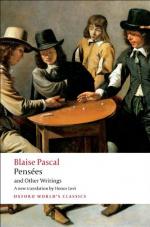|
This section contains 418 words (approx. 2 pages at 400 words per page) |

|
Discussion with Monsieur de Sacy Summary and Analysis
The Discussion is a brief dialogue that contains some of Pascal's less fragmented thought. It shows his attitudes towards Epictetus and Montaigne and features his view that while moral sloth leads to damnation, moral effort is insufficient for salvation and often generates pride that only appears to be charity. Real virtue must be based on grace.
Pascal opens arguing that Epictetus is one of history's great philosophers because he understood the duties of man. He believed that seeing God is one's principal aim and that God justly governs the world. In this world, Epictetus believed, you own nothing but are merely a steward of God's gifts. He can give and take away. Epictetus wants men to be humble, to hide good resolutions and no show them offer. But Epictetus failed to grasp man's...
(read more from the Discussion with Monsieur de Sacy Summary)
|
This section contains 418 words (approx. 2 pages at 400 words per page) |

|




